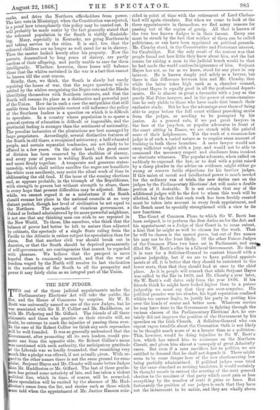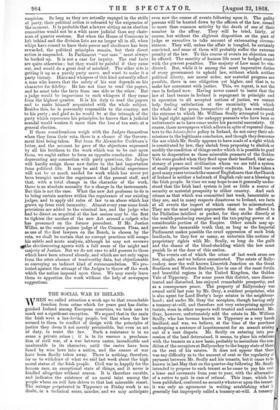THE NEW JUDGES.
TWO out of the three judicial appointments under the Parliamentary Elections' Act will take the public, the Bar, and the House of Commons by surprise. Sir W. B. Brett was universally named as one of the new Judges, but he was associated with Sir R. P. Collier and Mr. Huddleston, or -with Mr. Pickering and Mr. Giffard. The friends of all these
aimants and those who practise on their circuits will, no oubt, be extreme to mark the injustice of passing them over. n the case of Sir Robert Collier we think any such reproaches
I be well founded. It was so generally understood that the overnment, after promoting all its own leaders, would pro- de one from the opposite side, Sir Robert Collier's name as mentioned with such authority, the anticipatory gratitude f the Liberals was so loudly demanded, that something very uch like a pledge was offered, if not actually given. With re- rd to the other names there is not the same ground for com- ma. Serjeant Hayes and Mr. Cleasby will make better Judges an Mr. Huddleston or Mr. Giffard. The last of these gentle- en lias gained some notoriety of late, and has taken a violent htical line, which in time, of course, will be rewarded. ore speculation will be excited by the absence of Mr. Hud- eston's name from the list, and stories such as those which ere told when the appointment of Mr. Justice Hannen coin- ranks and drive the Northern officeholders from power. cided in point of time with the retirement of Lord Chelms- ford will again circulate. But when we come to look at the three appointments in themselves, we find many reasons for passing out of the region of gossip. All that is known of the two less known Judges is in their favour. Every one must be struck by the fact that neither of them can be called politicians, or can have been appointed on political grounds. Mr. Cleasby stood, in the Conservative and Protestant interest, for Cambridge. But the only result of the contest was that people found out how little they knew about him, and the last reason for raising a man to the judicial bench would be that he had made the world confess its ignorance of him. Serjeant Hayes has not, so far as we know, stood for any place in any interest. He is known simply and solely as a lawyer, but there is this difference between him and Mr. Cleasby, that while the latter takes high rank as a. chamber counsel, Serjeant Hayes is equally good in all the professional depart- ments. He is almost as great a favourite with a jury as the purely Nisi Prius lawyers, and in the power of cross-examina- tion he only yields to those who have made that branch their exclusive study. But he has the advantage over these of being able to argue before the full court without provoking snubs from the judges, or needing to be prompted by his junior. As a general rule, if we put great lawyers in the face of the jury-box, or popular advocates in front of the court sitting in Banco, we are struck with the painful sense of their helplessness. Yet the work of a common-law judge is of such a varied nature as to require some amount of training in both these branches. A mere lawyer would not carry sufficient weight with a jury, and would not be able to command the necessary respect and obedience from insolent or obstinate witnesses. The popular advocate, when called on suddenly to expound the law, or to deal with a point raised by a sharp pleader in the advice on evidence, might either go wrong or reserve futile objections for his brother judges. If this union of moral and intellectual power is much needed for the ordinary run of trials, the new duties cast on the judges by the Parliamentary Elections' Act will make a double portion of it desirable. It is not certain that any of the additional judges will be the first to whom this work will be allotted, but the fact that such work has been freshly created must be taken into account in every fresh appointment, and the Bench must be specially strengthened with a view to its new functions.
The Court of Common Pleas, to which Sir W. Brett has been assigned, is to perform the first duties under the Act, and his appointment as a Judge of that Court is, to some extent, a hint that he might as well be chosen for the work. That he will be chosen is the merest guess, but out of five names his may not be the least likely. Of the other Puisne Judges of the Common Pleas two have sat in Parliament, and env filled Sir W. Brett's office in a Liberal Government. No doubt it is rare for a Solicitor-General to content himself with a puisne judgeship, but if we are to have political appoint- ments at all, it is better that they should be restricted to the lower seats, than that they should lead at once to the chief place. As it is, people will remark that while Serjeant Hayes was called to the Bar in 1830, and Mr. Cleasby a year later, Sir W. Brett's call dates only from the year 1846. If his friends think he might have looked higher than to a puisno judgeship we must say that they arc over-sanguine. His political promise was too slender, his legal reputation confined within too narrow limits, to justify his party in putting him over the heads of senior and better men. Whatever service he may have done to the Government in fighting through the various clauses of the Parliamentary Elections' Act, he cer- tainly did not improve the position of the Government by his speeches on the Irish Church. A Solicitor-General who can repeat vague twaddle about the Coronation Oath is not likely to be thought much more of as a lawyer than as a politician.
This, however, would be doing injustice to Sir W. Brett's law, which has raised him to eminence on the Northern Circuit, and given him almost a monopoly of great Admiralty cases. But even if a man sacrifices law to politics, we aro entitled to demand that he shall not degrade it. There might seem to be some danger here of the new electioneering law being partially administered. If political judges were tried by the same standard as revising barristers, it would certainly be thought unsafe to entrust the scrutiny of the next general election to the nominee of that party which must gain or lose everything by the number of seats it gains or loses. But fortunately the position of our judges is such that they have not the inducement to be unfair, and they are wholly above suspicion. So long as they are actually engaged in the strife of party, their political action is coloured by the exigencies of the moment. It is probable that a lawyer sitting on an election committee would not be a whit more judicial than any chair- man of quarter sessions. But when the House of Commons is left behind and the division lists are no longer all in all, when whips have ceased to have their power and obedience has been rewarded, the political principles remain, but their direct action is suspended. In Parliament "our man" must always be backed up. It is not a case for inquiry. The real facts are quite otherwise ; but they would be painful if they came out, and would do a great deal of mischief. The other side is getting it up as a purely party move, and want to make it a party victory. Hints and whispers of this kind naturally affect a man who knows that the safety of his seat depends on his character for fidelity. He has not time to read the papers, and he must take the facts from one side or the other. But a judge would be impervious to such whispers if they came from the highest quarter. It is his duty to read the papers and to make himself acquainted with the whole subject. Besides this, he is personally responsible to the country, not to his party ; and glad as he would be at the triumph of the party which represents his principles, he knows that a judicial scandal would weaken it more than the loss of ten seats at a general election.
If these considerations weigh with the Judges themselves when they form their rota, there is a chance of the Govern- ment hint being taken. But from Sir Alexander Cockburn's letter, and the account he gave of the objections expressed by all his brethren to the work which was to be cast upon them, we ought rather to form an opposite conclusion. After deprecating any connection with party questions, the Judges will hardly assign those new duties to the last importation from political life. It may be said that judicial experience will not be so much needed for work which has never yet been brought under the cognizance of the present staff, and that, with a total change in the character of the work, there is an absolute necessity for a change in the instruments. But this is not the case. What the new Act professes to do is to bring certain matters within the cognizance of our existing judges, and to apply old rules of law to an abase which has grown up from rank immunity. Almost every year some fresh provisions are added to the criminal law, and the judge who had to direct an acquittal at the last assizes may be the first to tighten the meshes of the new Act around a culprit who has presumed on the former precedent. If Mr. Justice Wines, as the senior puisne judge of the Common Pleas, and as one of the first lawyers on the Bench, is chosen by the rota, we shall be certain that no corrupt practices will escape his subtle and acute analysis, although he may not overawe he electioneering agents with a full sense of the might and majesty of Justice. But we do not care to add guesses to those which have been uttered already, and which are not only vague from the utter absence of trustworthy data, but objectionable as conveying an indirect kind of recommendation. We pro- tested against the attempt of the Judges to throw off the work which the nation imposed upon them. We may surely leave them to apportion the work without the help of newspaper suggestions.































 Previous page
Previous page